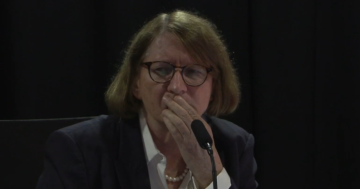
Kathryn Campbell has been named in the APSC investigation into Robodebt and APS Code of Conduct breaches. Photo: Supplied.
Former department secretaries Kathryn Campbell and Renée Leon have both been found to have breached the public service code of conduct in their handling of Robodebt.
They failed in their obligations a total of 25 times during their tenures at the Department of Human Services, according to an Australian Public Service Commission investigation that publicly released its findings on Friday (13 September).
The roles of 16 current and former Australian Public Servants in the rollout of the illegal debt recovery scheme were examined in the inquiry.
All up, 12 former and current public servants were found to have breached the APS Code of Conduct a total of 97 times, but only the two former agency heads have been identified in the inquiry’s report.

Renée Leon has been named in the APSC investigation into Robodebt and APS Code of Conduct breaches. Photo: Region.
In releasing the final report of the Centralised Code of Conduct Taskforce, APS Commissioner Gordon de Brouwer apologised for the harm the scheme had caused to vulnerable Australians.
“The Robodebt Scheme was a failure of government in both policy design and implementation,” Dr de Brouwer said.
“The Australian Public Service acknowledges its role and takes responsibility for its actions, and is intent on learning from these failures to serve the government, parliament and Australian public better.
“I apologise as Public Service Commissioner to those affected by the scheme and to the Australian public for the part played by public servants in this failure.”
The 97 breaches include lack of care and diligence, and lack of integrity in performing duties, as well as instances of misleading others and failing to uphold APS values.
Sanctions have been imposed against the four current APS employees found to have breached the code, and include a mix of reprimands, demotions and fines.
According to the report: “Sanctions are not considered as punishment of individuals, rather as restorative to ensure awareness for future conduct and to reinstall community confidence in public service administration.”
The former public servants found to have breached the code are not subject to APS sanctions.
Ms Campbell and Ms Leon, however, will have to disclose the finding against them should they seek government work or contracts over the next five years.
The findings against Ms Campbell are that she:
- Failed in 2017 to ensure that internal and external legal advice about the scheme was sought
- Failed to sufficiently respond to public criticism and some whistle-blower complaints received by her in early 2017 about the scheme
- Failed in 2017 to investigate legal issues raised in a public forum, namely the annual meeting of the Australian Institute of Administrative Law, about the scheme
- Failed in 2017 to ensure that her Minister was fully informed of academic and legal criticisms raised in that public forum in respect of the scheme
- Created and allowed a culture that prevented issues about the scheme from being properly considered within the Department of Human Services, including aggressive and abusive behaviour by a Deputy Secretary, and
- Caused the resumption of income averaging under the scheme in August 2017 when she knew, or ought to have known, that debts raised pursuant to that process were potentially inaccurate.
Allegations not substantiated were that Ms Campbell misled Cabinet, directed that legal advice cease, and failed to discharge her legal obligations with respect to the engagement of consultancy firm PwC.
The findings against Ms Leon are that she:
- Misrepresented to the Ombudsman in March 2019 that the department’s legal position regarding the use of income averaging under the scheme was ‘not uncertain’
- Failed in March 2019 to correct or qualify representations made to the Ombudsman of the department’s legal position on the use of income averaging under the scheme after receiving further legal advice
- Failed in mid-2019 to ensure that the Solicitor-General was expeditiously briefed and advice sought regarding the lawfulness of the scheme, and
- Failed to expeditiously inform her Minister and relevant Secretary colleague of the Solicitor-General’s advice on the lawfulness of the scheme and cease the practice of income averaging under the scheme.
The APSC task force went to great lengths to consider the well-being and dignity of all those it was investigating – a decency Robodebt’s architects and instigators didn’t afford the recipients the scheme’s debt notices.
The Robodebt automated debt recovery scheme was piloted in 2015 and fully rolled out between 2016 and 2019 by the Department of Human Services and its successor, Services Australia, with more than 470,000 false debts issued.
It caused extensive grief and trauma. Some recipients are reported to have taken their own lives over the debts.
It was officially scrapped in 2020, with the promise of paid debts being refunded in full.




















